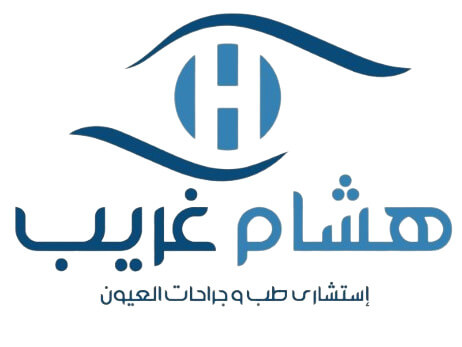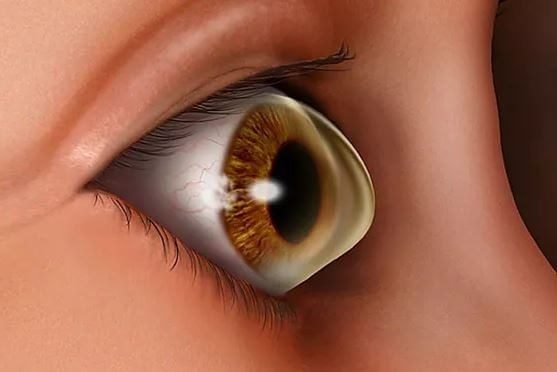Have you been told you have keratoconus and are worried that surgery is your only option? You’re not alone. Many people across Egypt—especially in Cairo and Giza—are diagnosed with keratoconus each year and are understandably anxious about what comes next.
The good news? Thanks to major advances in eye care, keratoconus can often be managed effectively without surgery, especially when caught early. In this guide, we’ll walk you through non-invasive treatments that can protect your vision and slow the disease’s progression—without the need for a corneal transplant.
 What Is Keratoconus and How Does It Affect Vision?
What Is Keratoconus and How Does It Affect Vision?
Keratoconus is a progressive eye condition that weakens and thins the cornea, the transparent front surface of the eye. Instead of maintaining its natural round shape, the cornea starts to bulge into a cone-like structure.
This irregular shape disrupts how light enters the eye, leading to blurred vision, increased sensitivity to light, and difficulty seeing at night. Many people also experience frequent changes in their eyeglass prescription as the condition advances.
If left untreated, keratoconus can lead to significant visual impairment and, in severe cases, may require a corneal transplant.
Early Signs and When to Seek Help
Early detection is key. Progressive keratoconus usually begins in the late teens or early 20s and may worsen over time. Watch out for symptoms like:
- Blurred or distorted vision
- Increased astigmatism
- Light sensitivity
- Frequent prescription changes
- Difficulty seeing at night
If you notice any of these keratoconus early symptoms, it’s important to consult with a cornea specialist in Egypt as soon as possible. Early intervention can help you avoid corneal transplant and maintain better vision for longer.
Can Keratoconus Be Treated Without Surgery?
Yes—many patients can manage keratoconus without surgery, especially in the early to moderate stages. Non-surgical methods focus on:
- Stabilizing the cornea to stop the disease from progressing
- Improving visual clarity using specialized lenses
- Delaying or eliminating the need for surgical options
Your ophthalmologist will determine the best course of action based on your specific case and the current shape and thickness of your cornea.
Non-Surgical Options: Lenses, Cross-Linking & More
1. Rigid Contact Lenses
Rigid Gas Permeable (RGP) lenses are designed to create a smooth surface over your misshaped cornea. Unlike regular soft lenses, RGP lenses help improve visual clarity by covering the uneven cornea and focusing light correctly onto the retina.
In advanced cases, scleral lenses—a larger type of rigid lens—may be used to vault over the cornea, offering comfort and better stability.
– Ideal for: Moderate keratoconus, distorted vision
– Availability: Offered by many vision correction centers in Cairo
2. Corneal Cross-Linking (CXL Procedure Egypt)
This is one of the most effective non-surgical treatments for keratoconus. Also known as corneal stabilization, the procedure uses vitamin B2 (riboflavin) eye drops and UV light to strengthen the collagen fibers within your cornea.
This treatment doesn’t improve vision directly but halts disease progression, preventing further deterioration.
– Ideal for: Early to moderate stages of keratoconus
– Duration: 30–60 minutes per session
– Availability: Widely offered as corneal cross-linking in Cairo and Giza
3. Corneal Ring Implants (Intacs)
While technically a minor surgical procedure, corneal ring implants fall under the category of minimally invasive treatments. These small, curved devices are inserted into the cornea to flatten its shape and improve vision.
They are often used alongside other non-surgical methods and can delay the need for a corneal transplant.
– Ideal for: Patients who don’t tolerate lenses well
– Combined with: Cross-linking or rigid lenses
4. Keratoconus Laser Options
Laser-assisted procedures like topography-guided photorefractive keratectomy (PRK) may help improve vision in selected cases, often in combination with cross-linking. However, these are not suitable for all patients and require a thorough evaluation by a cornea specialist in Egypt.
When Is Surgery Necessary?
If non-invasive treatments are no longer effective—particularly in advanced stages where the cornea becomes scarred or extremely thin—your eye doctor may recommend corneal transplant surgery. This is typically a last resort.
Many patients in Egypt who receive early non-surgical keratoconus treatment never require surgery.
Cost of Non-Surgical Treatments in Egypt
The cost of keratoconus treatment in Egypt varies based on the procedure and the clinic:
- Rigid Contact Lenses: EGP 3,000 – 8,000 per pair (depending on type and custom fitting)
- Corneal Cross-Linking (CXL): EGP 6,000 – 12,000 per eye
- Corneal Ring Implants: EGP 15,000 – 25,000 per eye
- Follow-up Consultations: Usually EGP 500 – 1,000 per visit
Dr. Hesham Gharib’s clinic offers competitive, transparent pricing with advanced diagnostic equipment and personalized care plans for every patient.
FAQs About Long-Term Results and Safety
Is cross-linking safe?
Yes. It’s an FDA-approved, clinically proven treatment with high safety rates when performed by an experienced specialist.
Will I still need glasses or contact lenses after non-surgical treatment?
Most patients do, but their prescriptions remain stable, and vision improves significantly with lenses or minor adjustments.
Can keratoconus come back after cross-linking?
The goal of CXL procedure Egypt is to halt the progression, and studies show it is effective in over 90% of cases for many years.
You don’t have to face keratoconus alone—or rush into surgery. Today’s advanced, non-invasive eye treatment options can provide excellent outcomes, especially when tailored to your unique condition.
Whether you’re in Cairo, Giza, or anywhere across Egypt, Dr. Hesham Gharib, one of the best cornea specialists in Egypt, is here to help you navigate your treatment journey with expertise, compassion, and confidence.
📞 Ready to explore your options? Book a consultation today and take the first step toward clearer, more stable vision—without surgery.


 What Is Keratoconus and How Does It Affect Vision?
What Is Keratoconus and How Does It Affect Vision?